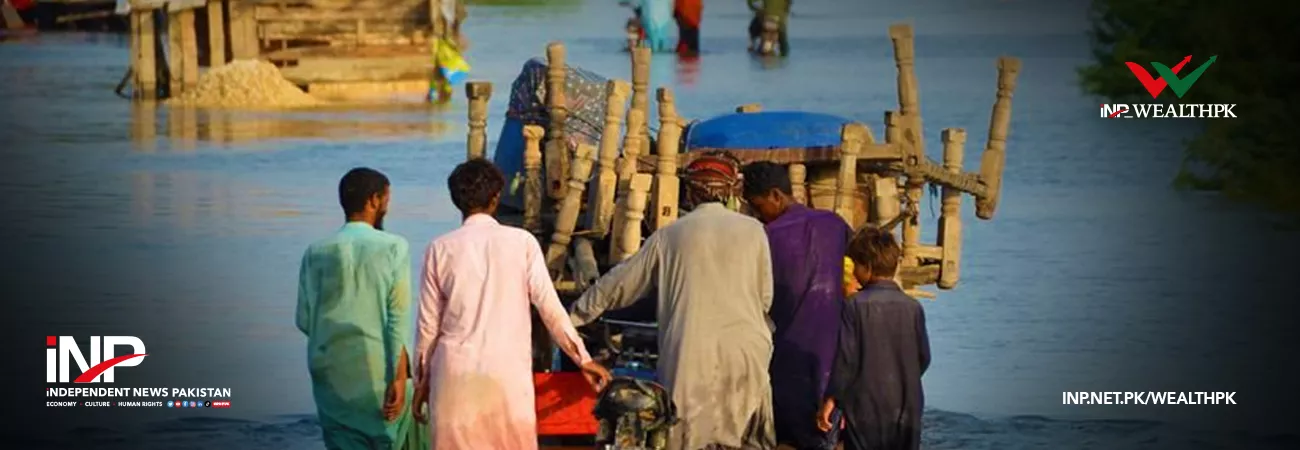INP-WealthPk
The Board of Executive Directors of the World Bank has approved $1.692 billion in financing for five projects to assist residents of Sindh province who have been impacted by floods. According to the World Bank, two programmes provide health services for women and children while three initiatives assist disadvantaged communities with rehabilitation, home rebuilding, and crop production restoration. In order to help Pakistan's government and people recover from the recent flood crises and build long-term resilience to such climatic shocks, the World Bank stated that it will continue to provide assistance.
The province most severely impacted by the floods of 2022 was Sindh, where people lost their jobs, and there was significant damage to the housing, healthcare, and agricultural sectors, the World Bank's Country Director for Pakistan, Najy Benhassine said. “Beyond the rehabilitation and reconstruction of damaged houses and infrastructure, our engagement in the flood response effort is an opportunity to strengthen resilience, and reform institutions and governance structures,” he added.
Through the $500 million Sindh Flood Emergency Rehabilitation Project, the government would be better able to respond to catastrophes, repair damaged infrastructure, and offer short-term livelihood prospects. The project will assist in repairing and upgrading vital roadways, water supply systems, irrigation, and flood protection infrastructure, as well as other relevant infrastructure.The repair and resilient reconstruction of crucial infrastructure would assist at least 2 million people—roughly 50% of whom are women—in the most flood-affected regions.
About 100,000 households will get short-term income support through a community-level cash-for-work initiative. This will help with livestock restocking for the impacted smallholder livestock farmers and will comprise semi-skilled and unskilled labour, the World Bank said. Owner-driven and multi-hazard resilient rehabilitation of key housing units will be supported by the Sindh Floods Emergency Housing Reconstruction Project ($500 million).Some 350,000 housing units (almost 20 percent of the total housing rehabilitation needs for Sindh) will get funds for restoration and reconstruction thanks to a housing subsidy.
For homes suffering structural damage, cash grants will be given to help partially pay for reconstruction or restoration. To increase access to water and sanitation, twin pit latrines and simple rainwater collection systems will also be offered.The $292 million Sindh Water and Agriculture Transformation Project would boost agricultural water productivity, enhance integrated water resources management, and help farmers who were impacted by floods resume crop production. The project is anticipated to serve more than 885,000 households, or over 4.4 million people.
The initiative would give financial transfers to 800,000 flood-affected agricultural households to aid in the procurement of seeds, fertiliser, and other essential inputs in order to restore crop production as an urgent reaction to the floods. In the medium run, better irrigation services and agricultural assistance will benefit about 70,000 people and help increase farm revenue. An estimated 14,000 households will receive direct financial benefits from the pilot smart subsidy schemes targeting small- and medium-sized farmers.
The $200 million Sindh Strengthening Social Protection Delivery System Project would improve access to and usage of maternal and child health services while also bolstering the province's social protection delivery system. In order to support improved maternal and child health outcomes, particularly in the wake of service disruptions following the floods, the project supports alignment and connectivity with the Federal National Database Registration Authority and will give conditional cash transfers (CCTs) to 1.3 million mothers and their children.
In order to lessen the effects of the floods, notably food insecurity, and to continue using maternal and child health services, the CCTs will be made accessible to Sindh's bottom 15 districts, which were chosen based on the Multidimensional Poverty Index (MPI).The fundamental reproductive, maternal, newborn, child, and adolescent health and nutrition services would be made better in terms of both quality and usage thanks to the $200 million Sindh Integrated Health and Population Project.
Additionally, it will aid in the repair and rebuilding of health infrastructure that was harmed by the floods and impeded the provision of these services. The project would increase the population's access to high-quality healthcare services in Sindh's flood-affected communities as well as in distant and peri-urban regions, particularly for women, girls, and children.
Credit : Independent News Pakistan-WealthPk




